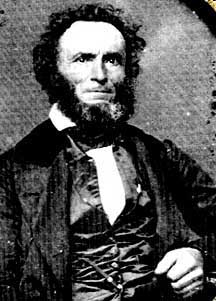Friedrich Muench
Friedrich Muench in 1834 led the Giessen Emigration Society to the New World in the hopes that they might be able to create a democratic German state in America.
Born in 1799, Muench was a Lutheran pastor back home in the small town of Nieder-Gemuenden, in Hesse, as was his father before him. However, his passion led him more toward politics and the literary arts. When he came to America, he had no desire to continue his pastoral work. Friedrich Muench wrote extensively newspapers and periodicals in German and English for the American market. He also wrote commentary for periodicals back in the Fatherland under his pseudonym, "Far West." At the time of his arrival, Missouri seemed just that to the German immigrants, although it had been a state for 13 years. While the society’s dream did not work out entirely as planned, Friedrich settled on a farm on Lake Creek in Warren County west of St. Louis near the Missouri River, along which many Germans decided to live. Known as “Papa Muench” to the Missouri Germans, he played a notable role in the state's politics throughout the 19th Century and especially around the time of the Civil War, when he served in the Missouri legislature. His strong stand against the evils of slavery is a source of pride to his descendants, although it made enemies at the time among those Missourians who didn’t cotton to idealistic newcomers questioning their ways. In fact, it was the Missouri Germans who kept the state in the Union and pushed for emancipation. "...It would be better for us to make every effort to save from perdition this state we have chosen as our new homeland: in that case we would be accomplishing as great and important a work as history has to offer," Friedrich Muench said in an article in the Anzeiger des Westens newspaper, March 31, 1862. "If we reconcile ourselves to the notion of free labor existing alongside slave labor..., then we will be guilty of holding our state back from the progress of the free states, and we shall never win full freedom for ourselves or our descendants."* Muench died in 1881 while tending grapes in his vineyard. He and his brother Georg had experimented with grafting European grape varieties on American roots, a practice that is still followed today in wineries around the world as a way to fight phylloxera. Muench had written a book on viticulture that was still in print late in the 19th century. *Steven Rowan, trans., Germans for a Free Missouri, University of Missouri Press, 1983, p. 318. |

